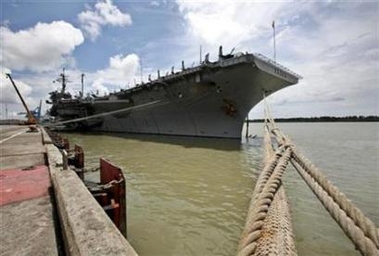China blocked a long-planned Thanksgiving visit to Hong Kong by a U.S. aircraft carrier group, then abruptly changed its mind on Thursday.

The USS Kitty Hawk carrier is anchored at Malaysia's West Port in Port Klang, outside Kuala Lumpur, August 28, 2007. China refused permission for the USS Kitty Hawk and accompanying vessels to visit Hong Kong for a long-planned Thanksgiving holiday visit -- and then changed its mind. (Bazuki Muhammad/Reuters)
But it was too late to save the holiday visit. A U.S. official said the trip has since been scrapped and the ships continued steaming to their Japanese base.
The USS Kitty Hawk group and its 8,000 airmen and sailors were expected in Hong Kong on Wednesday, but the U.S. State Department said the visit had been refused by China.
Hundreds of relatives of U.S. crew members had flown to Hong Kong to celebrate Thanksgiving on Thursday. Later in the day, China appeared to have relented, announcing the carrier would be allowed to stop by the former British colony after all.
"We have decided to allow the Kitty Hawk to stay in Hong Kong during Thanksgiving," Foreign Ministry spokesman Liu Jianchao told a news conference. "It is a decision based on humanitarian considerations only."
But a spokesman for the U.S. Pacific Fleet in Hawaii told Reuters the ships were not heading back to Hong Kong and were on course towards the Kitty Hawk's base in Japan.
"The Kitty Hawk's returning to Yokosuka," said Lieutenant Commander John Filostrat. He said he was not in a position to say why the ships did not head to Hong Kong after the Chinese reversal or if a turnaround would have been too late.
"When they were refused entry they began heading back and that remains the situation," he said.
The holiday misadventure has left families dismayed and could become a diplomatic tiff.
"I miss my daddy," said Mark Curry, 14, whose father is aboard one of the vessels. "We thought he was going to be there, but we don't know what actually happened. I was just depressed."
MEETING WITH DALAI LAMA TO BLAME?
The Chinese move came as a surprise just weeks after a visit to China by U.S. Defense Secretary Robert Gates, which he hoped would lead to a long-term dialogue.
Spokesman Liu did not say why the ships had been blocked in the first place, but there are issues that might have prompted Beijing's action.
Washington plans to sell Taiwan a 0 million upgrade to its missile system and there was last month's meeting between U.S. President George W. Bush and the Dalai Lama, the Tibetan Buddhist leader whom Beijing considers a traitor.
Last year, a Chinese submarine surfaced unusually close to the Kitty Hawk near the Japanese island of Okinawa, an incident that highlighted the potential for friction between the two powers.
Beijing's move coincided with "airspace controls" introduced on Wednesday which the Xinhua news agency said affected the air travel plans of 7,000 people in south and east China.
The controls had been ordered for "unspecified reasons."
The Kitty Hawk, laid down in 1956, has the second longest active service of any ship in the U.S. navy after the USS Constitution, a 208-year-old ceremonial sailing ship kept in Boston Harbor.
It is the only conventionally fuelled carrier in the U.S. fleet and is due to be decommissioned next year.
Hong Kong, especially its raucous Wanchai bar district, has long been a regular port of call for resting U.S. sailors. The Kitty Hawk visited there for a Thanksgiving stopover in 2005.
"For a lot of guys, this (Hong Kong) is their favorite port in the entire area of operations for us in the Western Pacific," a U.S. navy member told Reuters.
"Everyone in Wanchai is disappointed," said Cady Chan, the manager of the New Makati Inn, a popular nightspot for sailors.
"This was the last time the Kitty Hawk was coming to Hong Kong, this would have been a red-hot time."

Editor: canton fair |




